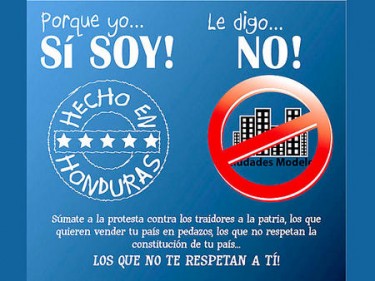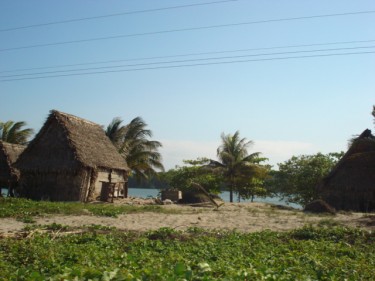The government of Porfirio Lobo caused great controversy after it recently signed [es] an agreement with Group MGK to implement a variant of Charter Cities, called Special Development Regions (REDs), in Honduras.
Some, like Ryan William Nohea Garcia from Libertopia underground, welcome the project:
Rejoice! Honduras’ Regiones Especiales de Desarrollo (Special Development Regions (REDs)) are official. (Roundup of news: here, here, and here.) REDs are forums within Honduras for innovative political and legal systems that better promote prosperity by securing Individual rights, offering stable regulatory and judicial structures, and implementing more streamlined immigration procedures. This is great news for Hondurans and the greater Free City movement. This blog post recognizes and praises the Honduran officials who advocated and implemented for REDs, a fortiori in the face of significant domestic, nativist opposition.
REDs can only be implemented in uninhabited land; in the case of Honduras, however, 24 Garífuna communities could be removed from their territory. The blog Being Garifuna explains:

“Because I was made in Honduras, I say NO. Join the protest against the traitors of the country, those who want to sell your country piece by piece, those who don't respect the constitution of your country, those who don't respect you!” Poster by Anonymous Honduras. No rights reserved.
Garifuna people are a unique afro-Caribbean ethnic group descended from indigenous Arawak Indians, Carib Indians and escaped African slaves who lived together in St. Vincent. The Garifuna of Honduras’ northern coast have been struggling for decades to protect their lands from predatory investors eyeing coastal lands for large-scale tourist projects, mega-hotels, and gated vacation communities. The “Charter City” project—brainchild of NYU economist Paul Romer—which aims to create a sovereign, business-friendly city-state on the Northern coast, is one of the biggest threats.
According to several reports, these lands have belonged to Garífuna communities since 1804 [es]. In a post on the issue, Tim Russo from Upside Down World quotes Miriam Miranda, president of the Black Fraternal Organization of Honduras (OFRANEH):
Vallecito is the heart of the territory where they are promoting the creation and installation of Honduras’ Charter City. So, we are not only up against the interests of organized crime; we’re up against the interests of a government that—without consulting us—makes decisions about our territory.
More than 200 families currently live in Vallecito, on the Atlantic coast of Honduras, and their voices were not taken into consideration when signing the agreement.
The project is the brainchild of Paul Romer. Mr Romer and other experts were appointed to become members of the Transparency Commission for the Special Development Regions (REDs) which was supposed to serve as the governance organ of the cities. However, up to this date these appointments have not been confirmed, raising doubts about the transparency and accountability of the project. Without the appointed Transparency Commission, the only safeguard for the transparency of the process is the Honduran Congress.
Many bloggers have criticized the project and demand that the government look after local peasants and farmers [es] instead of foreign companies. For others, like CapoSud [es], giving away the sovereignty of the territory is unconstitutional. Furthermore, other bloggers like Tony Molony [es] argue that the government is selling the country piece by piece, and Analisis Afrodescendiente describes this as the second phase [es] of the 2009 coup.
Anonymous Honduras launched #OpEstadoFallido (Operation Failed State), taking down several government websites [es]. There is also a petition on Avaaz [es] calling for the defense of the territory where the RED projects would be implemented. Another petition, in English, is hosted in GoPetition and promoted by OFRANEH. It reads:
According to public notices, the RED is to be established on the northern coast, the ancestral territories of the Garifuna and Miskito Peoples, violating their human, cultural, social and economic rights. International law and the legal framework on the territorial rights of indigenous peoples – including a number of instruments signed by the Government of Honduras – enshrine these rights. According to the hierarchy of norms, their application must be preferential and is mandatory.
Hondurans are not the only ones skeptical about the project. Duncan Green, a strategic adviser for Oxfam, expressed his concern and pointed out that such a structure in one of the most corrupt countries in the world will not work.
The project will be lead by Michael Strong, founder of a project called Conscious Capitalism. He argues that his project will deliver positive results: prosperity, jobs, and better living standards.
However, the community is already feeling this project's toll.

Garífuna Lands, by Renata Avila under a Creative Commons Attribution License.
Violence and extrajudicial executions are increasing in Honduras. During September, human rights defenders Antonio Trejo Cabrera and Manuel Eduardo Díaz Mazariegos were murdered. While the murders are not related, it is a worrying fact. Trejo was a lawyer defending peasants and Garifuna communities opposing the Special Development Regions.
The Inter-American Commission on Human Rights explains:
On September 24, 2012, the special prosecutor on human rights of the Choluteca Department, Eduardo Díaz Mazariegos, was killed with 11 bullets by two unidentified persons riding on motorcycles, in the vicinty of the headquarters of the Office of the Prosecutor in the city of Choluteca, in the southeast of Honduras.
On September 22, 2012, unidentified persons shot Antonio Trejo Cabrera in Tegucigalpa, and that in the previous he had received several death threats, which he had reported to the authorities. Antonio Trejo Cabrera was the legal representative of the Movimiento Auténtico Reivindicador Campesino del Aguán (MARCA), and he worked defending and promoting the rights of the peasant community cooperatives in the region of the Bajo Aguán.
A few days earlier, a group of Human Rights observers from different countries were threatened in the same area by masked, armed men.
Amnesty International also condemned the murder, and raised their concerns on increased violence and sexual abuse by private actors:
Private security personnel working for landowners and companies in Bajo Aguán have been accused of a series of alleged human rights abuses, including threats against local farmers as well as rape and other violent attacks.
The reaction by the Unified Campesino Movement of Aguan (MUCA) – the peasant movement which Trejo defended – was strong:
The Aguan campesino movement condemns this vile murder, which now is added to the list of those who have been shot and killed in their struggle to defend their people. On several occasions, Trejo denounced the threats he had received to the media and held the Bajo Aguan landowners responsible for any attempts to kill him or his family.
Trejo handled the legal affairs of the San Isidro, La Trinidad, and El Despertar cooperatives[…]
The Aguan campesinos are in solidarity with him and express our deepest condolences to his family, wife, and children.
The communiqué continues:
There is no doubt that Trejo's murder is a message from the powerful groups that live in the Aguan and those who make decisions in the country, to the campesinos
The situation is increasingly complex as the communities face legal and physical threats, now without the help of Trejo. With the signed agreement, in spite of all the opposition from civil society, the project will likely continue and the families will face eviction from the land they have inhabited for almost a century.
Furthermore, a Constitutional Reform is currently underway to authorize such cities. As reported by Human Rights Watch, Trejo had presented a constitutional writ, challenging the validity of the agreement signed by the government for the REDs. He joined the peasants in a peaceful protest against the government's measures in front of the Supreme Court of Justice on August 21, 2012. After repression from police forces, Trejo was arrested.
There are 22 pending constitutional writs opposing the REDs waiting to be solved. Most of them were presented by members of the community and civil society in Honduras, including Catholic priest Fausto Milla [es], who once headed the Civil Society Truth Commission. Honduras does not enjoy independence in their judiciary; in fact, the system is a quite corrupt, as pointed out by Special Rapporteur for Freedom of Expression, Frank La Rue, on his recent visit report [es].
Nevertheless, the Honduran Supreme Court of Justice will have the last word on the future of the project.







6 comments
You know what really hurts the garifuna communities? The extremly high murder rate, and devastasting poverty.
From Michael Strong’s Facebook Page:
The past week we’ve had several meetings with
independent groups of leaders from business and government in Honduras
in order to explain our project. Although many are initially skeptical
about the project, when we explain that our goal is to build on the
existing success of Honduran free zones by adding a full range of
community services, attitudes change. By the end of our meetings, we
consistently find that almost everyone
supports our project. Indeed, many have independently said, “This is
the best hope that Honduras has going forward!”
What is it that
turns attitudes around? One of our project partners, Bob Haywood,
wrote the original 1986 proposal that created the highly successful free
zones in Honduras. He predicted that those zones would create more
than 100,000 jobs. At their peak, before 2008, they had created an
estimated 140,000 jobs. In a country desperate for job creation, this
is a powerful message.
As importantly, Haywood acknowledges
that the first generation of free zones were flawed – precisely because
they were only industrial parks that did NOT take community into
account. So when we explain that Grupo MGK is creating a “Next
Generation” free zone that will create jobs AND provide affordable
housing, education, and health care for the workers, our message is very
appealing.
The bias I see in the article above gives me the feeling that there really is a group of people out there who likes to invent “endangered species” in an anthropological context.
Assuming you have your information right about whether this project will impact Garifuna lands, which you don’t, have you thought that Garifuna are people with needs like anyone else and that they could benefit from having jobs? Your values are backwards, just saying. Look before you pounce.
The article bootstraps its proposed legitimacy by assuming the quoted portions are fact. I can assure you that they are not. Whether the “legal” representatives (majorly differing from a lawyer in the States) are from San Pedro, Tegus, La Ceiba or elsewhere, they are generally known among the Honduranians to be the most crooked people in the country. Campesinos is the name they give themselves. Everyone else calls them “Invassiones” (illegal land invaders). The real issue derives from when the country ceased to be a true banana republic, and a big land ownership “reset” button was hit. Dole / Standard Fruit really had dispossessed indigenous people in the 1800’s – early 1900’s, and this needed to be redressed. Corporate commercial agrarian land ownership was stripped to the tune of about 80%. The federal records office was set up to register land ownership claims by “dominio plano”, or alternatively, title could be transferred via the equivalent of a quit claim deed. The latter is the primary transfer method, and carries a heavy discount per mansana due to the questionable title history. So, when a non-jurisdictional investor begins nosing around for development opportunities…invaders hop a fence, slap up a shack or a chompa, invite about 50 like-minded friends with 2 or 3 firearms between them, and get their “legal representative” to begin a land document production process with the local court. AND, it is far from involving only large corporate victims, or large individual landholder victims. FYI, the lawyer set the entire thing up. If they are successful, they try to arrange a quick flip to the developer. These lawyers are responsible for innumerable deaths of uneducated people when the inevitable shoot-out happens.
Secondly, there was no governmental coup in 2009. Same constitution, with the same representatives (and the existing representative from the same party for constitutional succession) – both pre and post-ouster of Mel Zelaya.